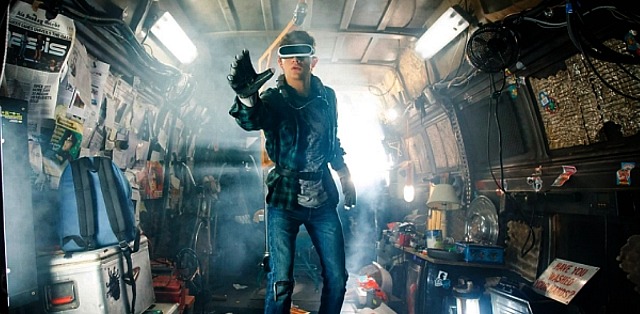After suffering a crushed skull during a rodeo, Brady Blackburn’s riding days are over as one more fall could kill him. He can still train horses (or so I recall — I saw it more than six months ago) but he’s mainly looking at dull, retail-store work for the rest of his life, and you feel really badly as the poor guy sulks and laments because he can’t do what he loves. And that’s pretty much it. I should be upfront and admit I wasn’t giving Chloé Zhao‘s film my undivided attention. I wasn’t dozing but I wasn’t riveted. It had my respect — it has an honest, real-deal vibe — but at the same time I was muttering “is this story gonna go anywhere? The guy’s in a bad spot — I get that — but is he going to find a way out of this predicament or off himself in the manner of Mickey Rourke in Darren Aronofsky‘s The Wrestler or what?” The Rider has an 85% Metacritic score.
 Jeffrey Wells
Jeffrey Wells
I Pant, Therefore I Am

Kim Jong-un can’t just stand there like an ordinary schlub as we watches a missile launch. He needs a soft easy chair, a desk (!), a desk pad with four silver weights and a nice pair of large binoculars. And his sycophants kiss his chubby ass like this all day long, 24/7/365.

Yesterday Tatyana and I did our favorite Beverly Hills hike — 14,000 steps and 4.5 miles. We park on Woodland right next to Bob Evans’ driveway, and then walk up Beverly Drive…up, up, up to Franklin Canyon Drive, up to the peak and down again, and then right on Lake Drive and onto a trail that winds all around and over the the hills but finally ends up on Royalton Drive, which then feeds onto Coldwater Canyon. And then we hike down Coldwater back to Evans’ place. A couple of hours.
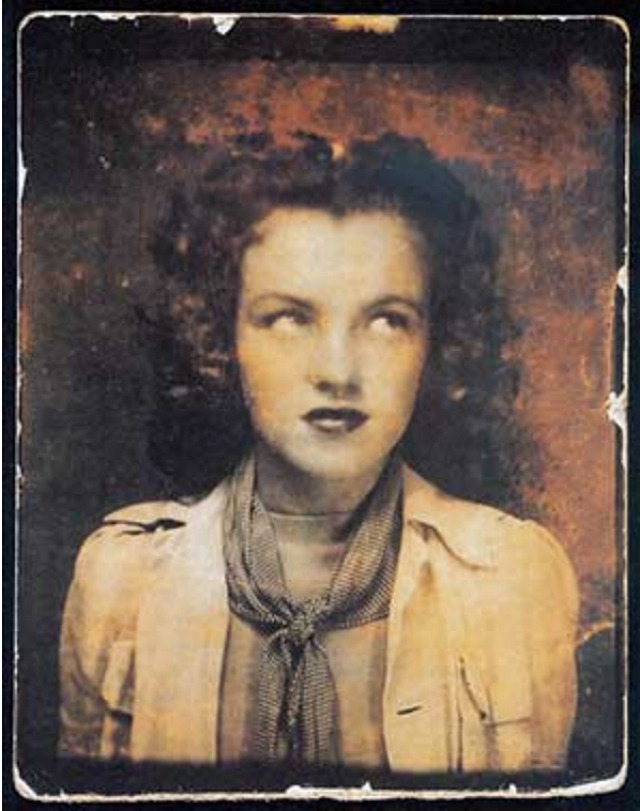
Marilyn Monroe in 1938, at age 12.
Cold-Hearted Bastards
My recollection of Jan Egleson‘s A Shock To The System (’90) is that it was a deliciously dark satire about a harried, middle-aged, losing-his-mojo advertising executive (Michael Caine) who decides to stop being the victim and play hard and dirty with all the people who’ve been threatening his job, injecting anxiety and otherwise making him miserable.
The film basically allows you to snicker along with Caine as he savors the meaning of the phrase “revenge is a dish best served cold.”
I’m writing this because I watched this trailer a while ago and went “what the?…this isn’t some dippy, feel-good comedy for morons…it’s about the satisfaction of giving bad people a taste of their own medicine.” The trailer is so full of shit that it reminded me of that online Shining trailer from 10 or 12 years ago that tried to sell Stanley Kubrick‘s 1980 horror film as a heartwarming family comedy.
From Owen Gleiberman‘s Entertainment Weekly review: “At the beginning of the exhilarating corporate satire A Shock to the System, the voice of Michael Caine comes on the sound track, soothing and seducing us as it has so many times before. That voice, with its halting cockney sparkle, its tones of ironic civility, is one of the most delicious sounds in movies, as unmistakable a comic signature as Chaplin’s bowlegged shuffle.
“Once again, Caine is playing a sneak, a rogue, and drawing the audience into a conspiracy with him-the way he did in Alfie (’66), the movie that made him a star, and then 20 years later in Hannah and Her Sisters. Only this time, his character is going to go farther — much farther.
“A Shock to the System is a black comedy played very, very close to the bone. Written by Andrew Klavan, and directed by the veteran independent filmmaker Jan Egleson, it’s a head-on satire of greed and power that’s also one of the most enticingly intimate portraits of American corporate life ever put on-screen.
Successful White Voice
I wanted to see Boots Riley‘s Sorry To Bother You (Annapurna, 7.6) at last January’s Sundance Film Festival because of Lakeith Stanfield, but then I began to think that a director whose first name was “Boots” might be more into diversion and razmatazz and shuffling the deck than dealing straight cards.
But The Guardian‘s Jordan Hoffman saw Sorry and said it “shows a great deal of spirit and promise” and that “it may even become a cult classic.” Those are critical code terms for “doesn’t quite do it or get there but maybe next time.”
On the other hand a 70% Metacritic score means you’ve gotten…well, a few things right.
Indiewire‘s Eric Kohn said it’s “loaded with capricious details that shimmer with the exuberance of inspired social commentary at hyperspeed”….huh? Variety‘s Peter Debruge complained that “the more ridiculous Riley’s gonzo social critique gets, the more boring it becomes, to the point that its out-of-control second half starts to feel like some kind of bad trip.” Financial Times critic Damon Wise said “it has its moments…but Riley’s vision needs a little more refining.”
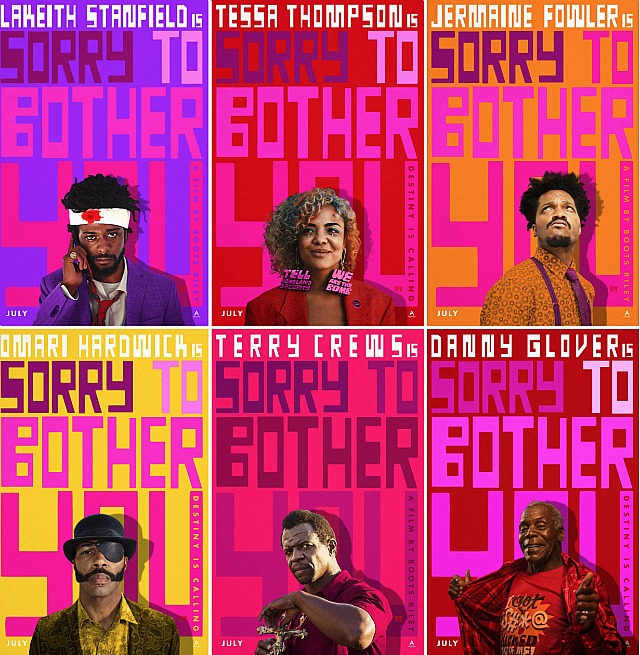
At Long Last Leon
During last year’s pre-Cannes Manhattan stopover I caught a screening of Tony Zierra’s Filmworker, a doc about Leon Vitali, the one-time actor who served a Stanley Kubrick’s right-hand-man for roughly 20 years. Several days later it screened at the 2017 Cannes Film Festival, under the Cannes Classics subsection. And then I sat down with Vitali and Zierra at the Grand Hotel. Now, ten months later, it’s been announced that Kino Lorber will open Filmworker at the Metrograph on 5.11, and at West L.A.’s Nuart on 5.18, “followed by a national rollout.”
And yet for some reason there’s no online trailer. Why? Where is it? Don’t tell me one hasn’t been cut.
My HE review was posted on 5.23.17: Tony Zierra‘s Filmworker, a 94-minute doc about the legendary Stanley Kubrick assistant and confidante Leon Vitali, is the juiciest and dishiest capturing of Stanley Kubrick‘s backstage life and career ever assembled. It’s about Vitali’s life, but by way of Kubrick’s. (Or is it the other way around?) 21 or 22 years of deep focus, late hours, nose to the grindstone, passion, obsession, total commitment and almost no days off, ever.
Vitali began working for The Great Stanley K. in various capacities a year before The Shining began shooting, and then stayed with him to the end (i.e., 3.7.99). Researcher, gopher, go-between, driver, casting assistant, print cataloguer and (after Kubrick’s death) restoration consultant. The film is a completely satisfying record and assessment of that servitude, that era, that history, that ongoing task.
The photos and behind-the-scenes film clips alone are worth the price, I can tell you. Great stuff. On top of which I was reminded that Vitali played not one but two roles in Kubrick films — Lord Bullington in Barry Lyndon (’75) and “Red Cloak” in Eyes Wide Shut (’99).
Vitali said to himself early on that he’d like to work for Kubrick. What he didn’t expect was that once that work began Kubrick would want Vitali at all hours, all the time…focus and submission without end. If the early sentiment was “I’d give my right arm to work for Stanley Kubrick.” Kubrick’s reply would be “why are you lowballing me? I want both arms, both legs, your trunk, your lungs, your spleen, your ass and of course your head, which includes your brain.”

Leon Vitali — star of Filmworker, Stanley Kubrick confidante and right-hand-man for 21 or 22 years, former actor and controversial aspect-ratio debater — and Vera Vitali, the Stockholm-residing actress, at Cannes Grand hotel last weekend.
OG on RPO: Virtual Whoo-Whoo Competes With Banality
It is axiomatic that trade critics will be as hospitable as honesty allows when it comes to major studio releases, especially those aimed at fantasy geekboys and especially when directed by a legend like Steven Spielberg. And so Variety‘s Owen Gleiberman is most likely fulfilling expectations in his review of Ready Player One, which premiered last night at SXSW.
But even under these conditions OG offers terms like “banal” and “slippery mutating synthetic digital imagery” and — this is probably key — “more occupied than invested.” OG was gripped by RPO, but his review also indicates that the general SXSW reaction (“We’ve found God! The entire crowd was levitating…shrieking with pleasure!”) was over-the-top.
And yet I love hearing that there’s a sequence in which Tye Sheridan‘s Parzival, Olivia Cooke‘s Art3mis and a Shrek-like avatar named Aech visit Stanley Kubrick‘s Overlook hotel.
“In Ready Player One, everything you could call virtual is clever and spellbinding,” he writes, “[and] everything you might call reality is rather banal.” Spielberg’s “dizzyingly propulsive virtual-reality fanboy geek-out” is “an accomplished and intermittently hypnotic movie [but],” he qualifies, “you may feel like you’re occupied more than you are invested.”
“Ready Player One tells a breathless and relatively coherent story — essentially, the future of civilization is riding on the outcome of a video game — but the movie, first and foremost, is a coruscating explosion of pop-culture eye candy. Never is that more spectacularly true than in the irresistible sequence in which [three virtual leads] enter the Overlook Hotel from The Shining.
Grain of Salt
Never accept ecstatic reactions from a South by Southwest crowd about any kind of geeky, sci-fi, gamer or comic-book movie at face value. SXSW devotees are whores for fanboy stuff. Take their expressions of wondrous delight and slice them in half if not by two-thirds, and that’ll be the likely reality of things when the film opens commercially.

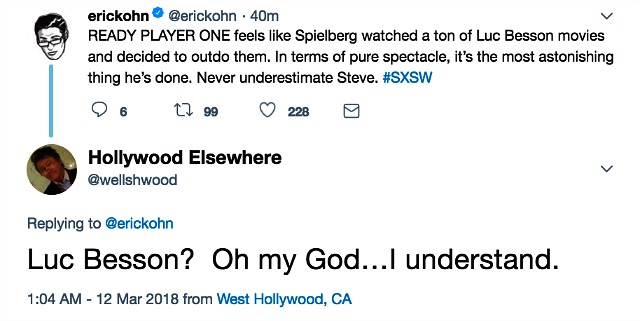
Barney Sheean Lives!
Robert Aldrich‘s The Legend of Lylah Clare (’68) is one of the worst inside-Hollywood movies of all time. And yet it has Ernest Borgnine‘s flamboyant Barney Sheean, a vulgar studio boss who despises the idea of making “films.” In Act One he yells at his studio executive son (Michael Murphy), “I don’t want to make films — I want to make movies. What do you think we’re making here, art?”
Tonight at Austin’s South by Southwest Festival, Steven Spielberg made an audience cheer by proudly trumpeting the Barney Sheean ethos. As he introduced his latest film, Ready Player One (Warner Bros., 3.29), Spielberg proclaimed, “This is not a film we’ve made — this is a movie!

Steven Spielberg! #sxswpic.twitter.com/hiXJjQoXt7
— Monica Castillo (@mcastimovies) March 12, 2018
Don’t Flatter Yourself, Maurice
Michael Caine is the latest coward to throw Woody Allen under the bus. The 84-year-old actor won an Academy Award for his role in Allen’s Hannah and Her Sisters and the facts are the facts, but that’s water under the bridge, Caine feels.
“I can’t come to terms with [the allegation],” Caine has told The Guardian‘s Michael Hogan “because I loved Woody and had a wonderful time with him. I even introduced him to Mia [Farrow]. I don’t regret working with him, which I did in complete innocence. But I wouldn’t work with him again, no.”
Caine worked for Allen in “in complete innocence” in 1985, or seven years before the alleged incident with Dylan Farrow happened? The nature of which Allen had never been accused of before and has never been accused of since?
The main subject of the Hogan interview is My Generation, about Caine’s journey through 1960s London. Caine is the narrator, co-producer and “star” as it were. Variety‘s Jay Weissberg gave it a mostly positive review during last September’s Venice Film Festival.
Brian Wilson’s Warmth of the Sun
I’ve posted this photo twice since the birth of Hollywood Elsewhere in August ’04. It was taken on a great blue-sky day in Italy nearly 18 years ago, somewhere south of Siena during a leisurely drive to Rome. I can recall the aroma and the summery air and the pastoral vibe like it happened yesterday. To this day I’m not sure what kind of flowers are dotting the landscape but I always refer to them as poppies (which I’m sure they’re not) when I show this to friends. I’ve tried to find this estate a couple of times since, but no dice. If this image rings a bell for anyone and they know the address or can provide a Google capture, please get in touch.
Infinite Hitler Reverberations
There’s a new Bluray of Oliver Hirschbiegel‘s Downfall (’04) out this month. The last Bluray version was released ten years ago, by the Momentum guys in England.
I’ve been a devout Downfall fan since catching it in Toronto 13 and 1/2 years ago; I interviewed producer Bernd Eichinger and the great Bruno Ganz in Los Angeles when they came to town several weeks later. It’s a legendary war film — tense, well-written, highly charged in all respects.
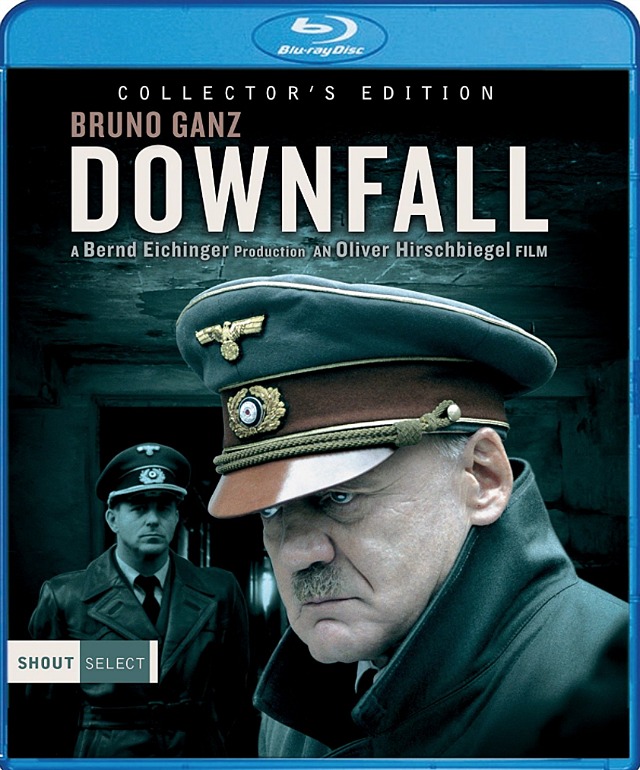
Of course, the reason Downfall is regarded as the biggest film of Hirschbiegel, Ganz and Eichinger’s career is not because of the dedication and artistry that went into its making, but the Hitler YouTube parody-rant phenomenon that was inspired by a single conference-room scene. Hitler parodies began…what, in ’06 or ’07 and now number over 1500 and perhaps over 2000 or even higher.
Given the fact that Downfall would be remembered only by cineastes today if the parodies had never taken off, wouldn’t you think that the producers of the two Blurays would have acknowledged this by including a short, good-natured essay on the influence of the parodies? To simply acknowledge the basic, irrefutable facts? Nope — neither Bluray even alludes to them. Which strikes me, no offense, as insane.
Bowls of Disappointing Cherries
Death of Stalin costar Jason Isaacs, quoted by The Guardian‘s Rachel Cooke in a 3.11 interview: “I’m just a dude who forgets to take out the rubbish. I’ve had a good year or two, but there have been other times [that weren’t so hot]. I’ve been to Sundance with eight films, and only one of them came out.

Death of Stalin costar Jason Isaccs (r.) and Deadline‘s Pete Hammond (l.) following a Stalin screening at the WGA theatre a few days ago.
“When I was in Peter Pan [he played Mr. Darling and Captain Hook in PJ Hogan’s 2003 film], it was going to be gigantic. I was told it would change my life. Be careful, they said — make sure you’ve got the right people in place. Then it came out, and it was a catastrophic flop. It killed my film career stone dead for a while.
“It was a great lesson — just have a great time and do the best you can. Sometimes I wish I was more famous; you have more choices as an actor when you are. But I tend to ask: how can I be grateful for the things I’ve got, rather than for the things I haven’t got? Moaning is a waste of life.”


